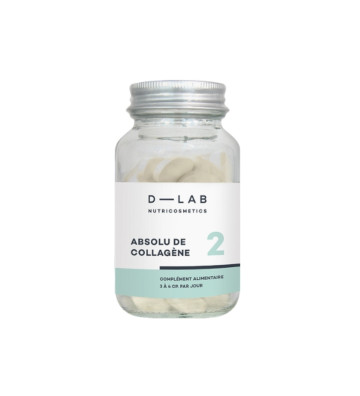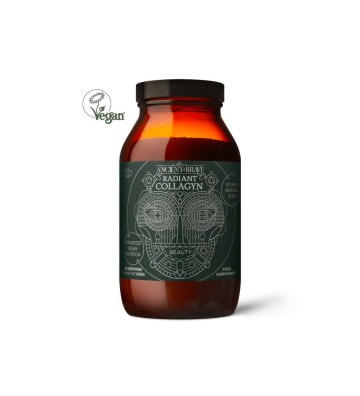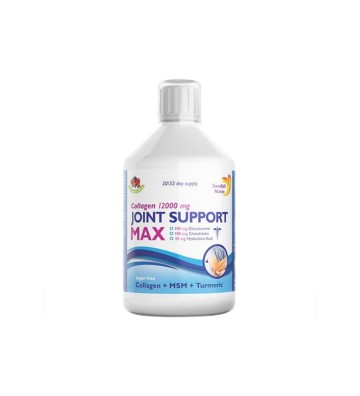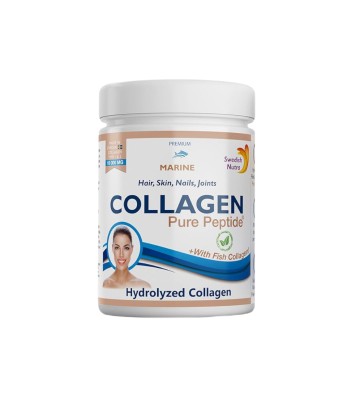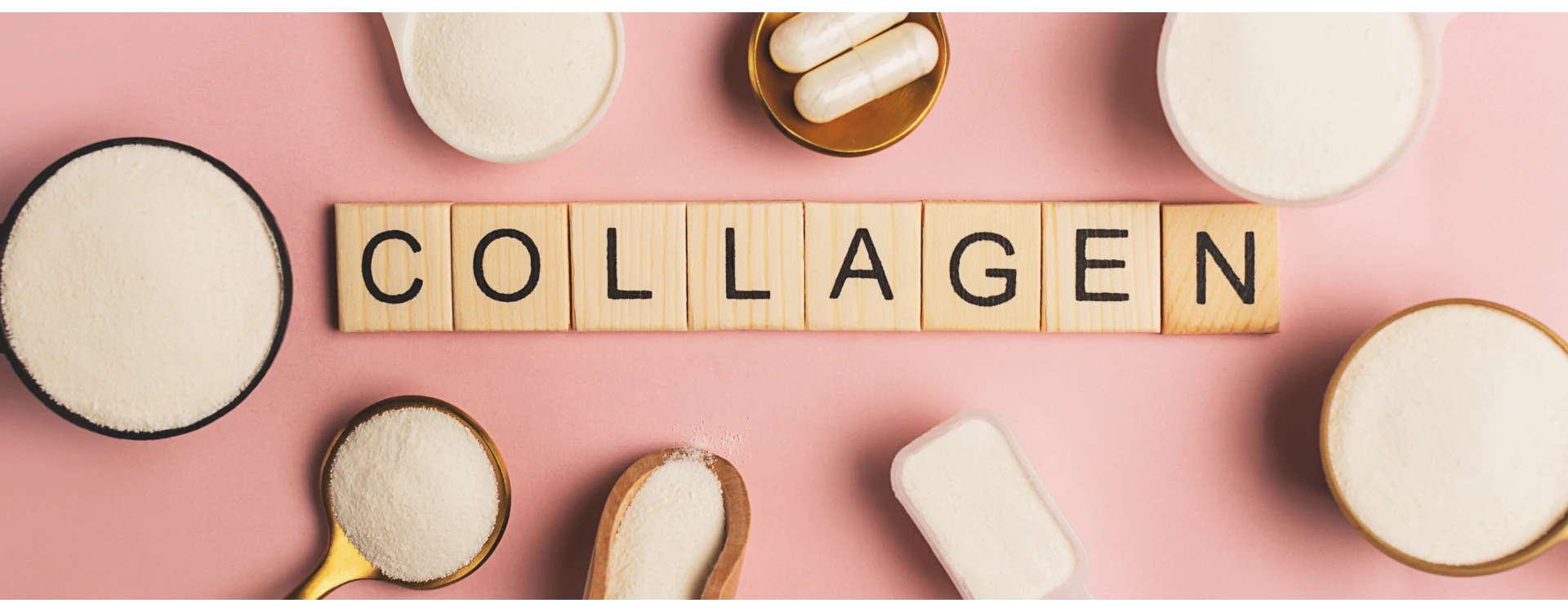
Collagen - what does it help, what properties does it have and how does it affect health?
Table of contents
Collagen is as much as 30% of all proteins in your body. Yes, that's right! That's why it's no wonder it's so important for the body, and in the context of various systems and the health of many organs. Including skin and joints, of course, but also many other tissues. Today we'll take a closer look at what collagen is and what it gives, what it affects, and which collagen to choose to make sure it works positively for your body.
Collagen - what is it?
Let's start with the basics, because - although there is a lot of talk about collagen - many people are still unaware of what collagen is. What is this substance and what functions does it perform in the body? It is a major structural protein that is the basic component of connective tissue. It's what supports and connects different parts of the body - including, of course, tendons, ligaments, but also skin, bones and cartilage. Collagen is a kind of "skeleton" for tissues. It provides them with mechanical strength, hardness, elasticity, as well as flexibility, which is so important in the context of the skin. Interestingly, collagen not only fills the space between cells, but also actively participates in many biological processes, such as blood clotting, wound healing and scar formation. So it is not easy to answer the question of what collagen gives, because it gives us so much!


Collagen - properties and types
There are about 30 different types of collagen in our body, and each of them performs specific functions. Therefore, the properties of collagen depend on its type. There are three main types:
- Type I collagen - is the absolute record-holder, as it accounts for about 90% of all collagen in our body. Its use is very wide, although most of it can be found in the skin. It is also present in tendons, ligaments and even the cornea of the eye. Its main function is to ensure the tensile strength of tissues, as well as to give rigidity to bones. It is primarily fish collagen and marine collagen.
- Type II collagen - predominates in articular cartilage, corneal epithelium and vitreous tissue. Its function is primarily to absorb shock, provide resistance to friction, protect bones from injury and, of course, give tissues elasticity. It is extremely important for joint health, so it's the ideal collagen for men and women who actively train or suffer from joint disease. Type II collagen is mainly beef collagen.
- Type III collagen - this type is mainly found in the skin, lungs, spleen, liver and blood vessels. It is type III collagen that plays a key role in wound healing. So, as you can see, the use of collagen in medicine, not only in the beauty industry, is highly recommended. It can be found in fish collagen, but bovine collagen also has it.
How collagen works depends not only on the type of this protein, but also on the type of supplement or the amount of collagen supplemented. We will supplement collagen differently for preventive purposes, and differently when we want to get rid of significant wrinkles or support ailing joints.
Collagen - what does it help with?
What does collagen help with? The action of this protein is extremely multifaceted, so it is possible to identify several areas in which it can really help our health. Skin is, of course, the first to come to mind. Collagen participates in the cell renewal of the skin and ensures that it has the right elasticity, tone, firmness and proper hydration levels. Therefore, the use of collagen preparations can slow down the aging process of the skin, delay the appearance of wrinkles and prevent dryness. Where else will collagen work? What does it give to bones and joints, for example? First of all, it supports the repair processes that occur in cartilage tissue. It is also responsible for improving joint health, increasing bone density and reducing the activity of enzymes that are responsible for inflammation and chronic pain. Low collagen levels can also contribute to osteoporosis, which is extremely rarely mentioned [1]. You may also wonder if collagen also works on other body systems. Yes - it also supports the health of the heart and circulatory system, something that is forgotten in the discussion of the protein's importance. Collagen helps the heart and blood vessels maintain their shape - it prevents them from weakening. It promotes tissue repair in the blood vessels, and reduces fat accumulation in the arteries. This is due to proline. Interestingly, collagen also supports the immune system, or more precisely, the body's defense processes against pathogens. Its action is extremely comprehensive. Does it end there?
So it's worth not only reaching for supplements, but also take care of your daily diet. What vegetables and fruits is collagen in? Although the collagen protein itself is not found in plants, many of them contain the ingredients necessary for its synthesis. Examples include foods rich in vitamin C, such as bell peppers, parsley, kiwi and citrus fruits, which support the body's natural production of collagen. Leafy vegetables, berries, tomatoes or garlic have a similar effect. Including them in your daily menu is a simple way to support skin elasticity and joint health - from the inside.
So it's worth not only reaching for supplements, but also take care of your daily diet. What vegetables and fruits is collagen in? Although the collagen protein itself is not found in plants, many of them contain the ingredients necessary for its synthesis. Examples include foods rich in vitamin C, such as bell peppers, parsley, kiwi and citrus fruits, which support the body's natural production of collagen. Leafy vegetables, berries, tomatoes or garlic have a similar effect. Including them in your daily menu is a simple way to support skin elasticity and joint health - from the inside.
Collagen - medicinal properties
Collagen's properties go far beyond the beauty industry or joint health care. In addition to its basic structural functions, collagen exhibits a number of medicinal properties. It participates in the process of blood clotting, which plays a special role in wound healing. It participates in regenerative processes, such as the formation of scars and the knitting together of bones after fractures. It protects internal organs, including the kidneys, liver and stomach. At the same time, it also supports the functioning of the digestive system. It has anti-inflammatory properties, and therefore makes it possible to relieve pain and discomfort - mainly in the joints. It supports in diseases of the digestive system, such as reflux or Crohn's disease. What does collagen provide? A veritable plethora of possibilities.
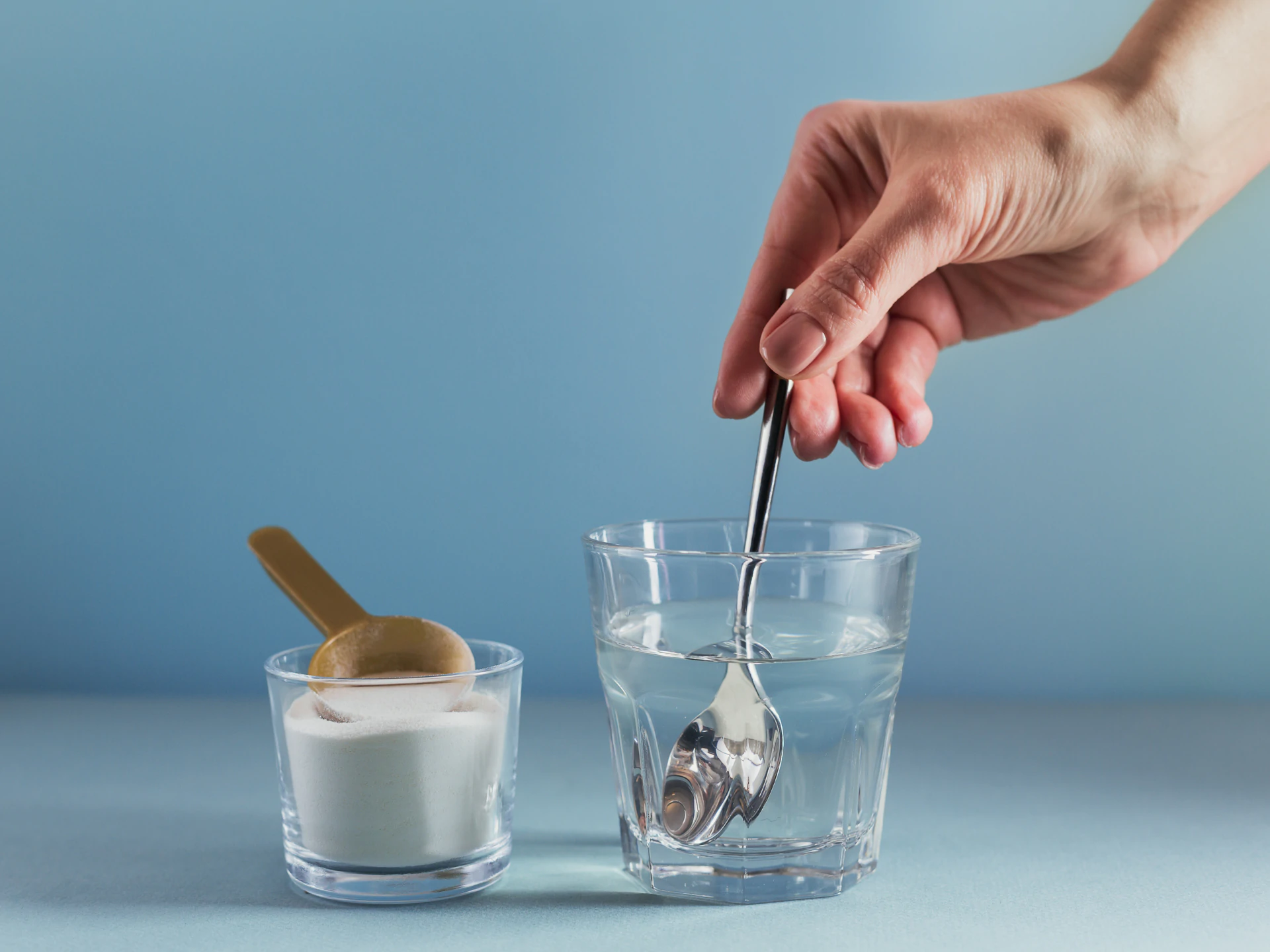

Symptoms of collagen deficiency and excess.
Both too little and too much collagen in the body can carry certain health consequences. Symptoms of collagen deficiency are primarily deterioration of the skin - its sagging, dryness and increased susceptibility to wrinkles. Deficiency can also manifest as joint pain, weakened bones, brittle nails and even problems with wound healing. It is also worth remembering that insufficient collagen can negatively affect the digestive system or blood vessels. What about when there is too much collagen? Although it is said far less often, excess collagen can also cause undesirable symptoms. These include joint stiffness, limited mobility, and thickening of the skin. In extreme cases, fibrosis can develop in the tissues. Therefore, it is important to supplement collagen consciously and according to the actual needs of the body.
Which collagen to choose?
The choice of collagen depends on many factors. First of all, it depends on what you want to achieve and what your needs are. We have some tips for you to help you decide.
- Choose the type of collagen that is right for you - this could be fish (or marine) collagen, which is ideal for those who want to support skin health. Or you can choose beef collagen - great for joint and bone health. And as an alternative... vegan collagen. It does not contain zoonotic proteins, but supports the body's natural production of collagen.
- Choose collagen with a lower molecular weight - such is better absorbed by the body, and therefore will work better.
- Decide on a simple, pure composition - without unnecessary additives such as preservatives, fillers or artificial colors.
- Additional ingredients can help with collagen production, so look for them in a supplement. This includes vitamin C, for example. You may also find biotin, hyaluronic acid, or minerals in the formulation, which enhance the action of collagen.
- The form of the supplement matters - liquid is best absorbed, as in Swedish Nutra, However, the choice is yours.
Collagen is not just a beauty supplement. It is a protein that has a huge impact on the health and proper functioning of the entire body. Is it worth supplementing? Certainly - with a view to beautiful skin, hair, but also functional joints or a healthy heart.
Source


